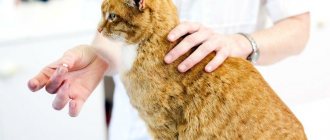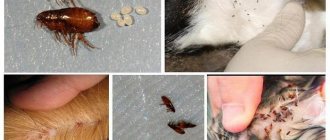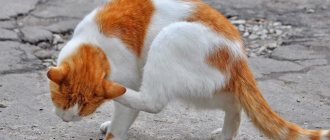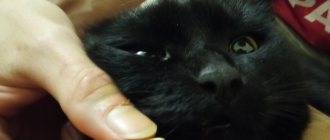Before treating your pet, let's figure out what helminths are and how to recognize the disease in time?
Helminthiasis is a disease caused by parasitism in the host body, namely in the small intestine, by helminths (worms). Both adults and small puppies and kittens are susceptible to helminthiasis.
Today, helminthiasis is widespread, since even those animals that do not go outside can easily become infected. How? Every day, several hundred parasite eggs are released into the environment, therefore, it is very easy to bring them into an apartment with shoes.
There are a huge number of helminths, they are divided into 3 groups: tapeworms, flukes, roundworms.
The presence of helminths in your pet's body can cause:
- - allergic reactions;
- toxic phenomena;
- blockage of the intestines or excretory ducts;
- anemia;
- hypovitaminosis.
Diseases can often be detected when parasites are detected in the feces of adult individuals, this is only the case when there are a huge number of parasites in the body. Helminthiasis poses a threat to human health, as it is a zoonotic disease that affects both animals and humans. Therefore, it is necessary to carry out timely treatment of the disease and preventive deworming once every three months. Over this period of time, quite a lot of helminths (worms) accumulate in the body of the infected animal, which must be destroyed, since there is a danger for all members of the family in which the animal lives.
How to worm a cat at home
If we take into account the rules and regulations, then only a veterinarian who has received such information from the test results as the type of parasites and lesions can carry out anthelmintic treatment. In addition, the doctor takes into account the fact that certain drugs affect a specific type of helminth, which allows him to choose the right treatment.
However, people often have to deworm cats at home, without qualified help. And the first thing you need to know if you find yourself in a similar situation is a list of medications suitable for deworming your pet:
- Pratel.
- Drontal.
- Trontsil.
- Milbemax.
- Polyverkan and others.
This is just a short list of medications suitable for deworming a cat at home. Below you can get acquainted with the best anthelmintics, and now we will reveal the nuances of using the drugs.
Common symptoms
To prevent your pet from suffering from terrible pain, you must immediately react to the following external signs that occur if worms live in the cat’s body :
- the mucous membrane turns pale or yellow;
- weight drops sharply;
- the appearance of shortness of breath, cough;
- the coat is dull and tousled;
- decreased appetite or refuses to eat at all;
- Meows very often, and suddenly.
If your cat has a massive infestation of parasites, then just look at your pet's feces and see these worms. If you do not rid the animal of worms in time, it may die.
© shutterstock
How to use anthelmintic correctly
For preventive purposes, the modern drug is given once. It is advisable to hold the event in the morning. No preparation is required for the procedure.
If deworming is therapeutic in nature, then the drug is given twice, with an interval of ten days.
The cat must be dewormed if you plan to vaccinate the animal. This must be done ten days before the start of the procedure.
Drugs are also given to pregnant cats three weeks before lambing and the event is repeated five weeks after the birth of the offspring.
Dewormers should not be used on young kittens earlier than three weeks.
How to determine whether you need to deworm
The question of whether a pet needs to be dewormed or not is not worth it. Deworming is necessary both when there are clinical symptoms of infection and to prevent helminthic diseases.
It is important to determine when a cat needs to be wormed immediately and in which situation the procedure should be postponed. The fact is that any anthelmintic is toxic to the parasite and, to a lesser extent, to the cat. Therefore, it should not be abused.
Be sure to read:
How many days before vaccination should a cat be given anthelmintic: why, how to do it correctly, the best remedies
When to worm a cat for prevention?
It is impossible to completely get rid of worms. It is likely that the body needs parasites in small quantities. Therefore, quarterly deworming helps keep the population at optimal sizes. To prevent helminthic infestation in kittens, cats are dewormed a month before the intended mating, regardless of the timing of previous treatments.
When to worm a cat before vaccination?
To form antibodies to pathogens, the immune system resorts to mobilizing all the forces of the body. If the animal is weakened by helminth toxins, insufficient absorption of vitamins and amino acids from the intestines, the formation of immune bodies slows down or their concentration does not reach protective values. Conditions called breakdown of immunity occur. The animal is struck by an infection against which it was vaccinated.
Therefore, 10 days before the first vaccination, kittens are dewormed.
Before deworming, you should study the instructions and make sure that the drug can be used for kittens younger than 8 weeks. Anthelmintics can cause a negative reaction in an animal not because they are toxic, but because they are highly infested. When mass death occurs, parasites release toxic waste products. Therefore, the kitten’s body should be given the opportunity to recover from the effects of the anthelmintic drug.
The result of immunization is confirmed 2-4 weeks after the first vaccination, depending on the instructions developed by the manufacturer. Therefore, there is no need to carry out separate deworming before the second immunization. Manufacturers of biological products recommend additional deworming of adult cats 10 days before annual vaccination.
Folk remedies for deworming domestic cats
Various folk remedies can also be used for treatment and prevention. The most popular among breeders include:
- Sugar solution. If your pet refuses to drink sweet water, you can give it something to drink using a syringe.
- Fennel or chamomile in the form of a decoction. The infusion should be given to cats instead of water.
- Onion water. To obtain the infusion you will need an onion and a glass of boiled water. Chop the onion into water and let the mixture sit for one day. Give this water instead of regular liquid. The recommended duration of this home “treatment” is seven days.
- Infusion of common tansy. To obtain a decoction you need a tablespoon of flowers and a glass of boiling water. The decoction should be left to steep for one hour. You need to give your cat water three times a day, an hour before meals.
- Tincture of wormwood in alcohol. Dosage – 10 drops twice a day, an hour before meals.
- Enema based on carrot juice. Apply once a day. The duration of the procedure is seven days.
Tansy
Attention! The folk method of deworming a cat at home is for informational purposes only and is not a call to action. Cats are all different, each animal has its own body characteristics. And it is quite possible that the folk method that rid your neighbor’s cat of worms will not be successful in your case. What’s worse is that your pet may get poisoned or have a gastrointestinal disorder.
General rules for the use of anthelmintic drugs
The drug is given to the cat in the recommended dosage, usually in the morning - you do not need to tie the use of the drug to meals, but to reduce the likelihood of side effects, it is better to give the drug before meals . Almost all modern medications are given to the animal once; repeated administration is necessary after 10-12 days. After the procedure, it is advisable to take tests and show your pet to a doctor to make sure that the parasites are destroyed.
Along with the use of anthelmintic therapy, it is necessary to observe the rules of hygiene - wash the tray immediately after the cat goes to the toilet, thoroughly clean the places where it sleeps and eats, and also treat them with disinfectants.
Video - How to worm a cat
How to give a cat medicine
Most likely, it will not be possible to persuade a cat to take medicine, so the owner of the animal needs to choose one of the options - to act by force or by cunning.
Method number 1 . The medicine should be mixed with the pet’s favorite treat (the tablets should be crushed into powder beforehand) and the pet should be given a “cunning” dish to eat. Canned foods are best suited for these purposes: pates, mousses and other products that have a puree-like consistency. The disadvantage of this method is that the cat will never eat the treat if it smells foreign impurities in it.
The best canned food for cats
Method number 2 . Use a special device called a piller or a regular syringe without a needle to take the medicine. The drug should be taken into a syringe (crush the tablets and mix with a small amount of liquid) or fix the tablet in a piller, then place it on the root of the animal’s tongue, squeeze the jaws and stimulate swallowing by stroking it along the throat. It is better to carry out this procedure together with an assistant, the downside is the likelihood of revenge on the part of the offended pet (in retaliation for violence, some cats may tear clothes or furniture, urinate in shoes, etc.).
Special device - peeler
Important! When deworming, minor side effects are allowed in the form of salivation or gastrointestinal disorders, which go away on their own within 1-2 days. If your cat has a fever, lethargy, pain or other alarming symptoms, you need to show her to the veterinarian, and in the future, choose a different anthelmintic drug.
Video - How to give a cat a pill
Folk remedies for worms in cats
Traditional recipes for the treatment of helminthic infestations in cats are considered safer for health than pharmaceutical drugs, but in reality this is not the case. They can also cause side effects and negatively affect the health of the pet, and, in addition, their effectiveness is several times lower than that of medications.
- Pumpkin seeds. Take 5 g of peeled pumpkin seeds, chop, mix with the same amount of lard or vegetable oil, and then feed the mixture to the cat. Repeat the procedure for 5 days in a row, and a new portion of the medicine must be prepared daily.
Pumpkin seeds
- Onion. Divide an ordinary onion into parts, pour a glass of well-boiled water, and let stand for half an hour. Give the resulting liquid to the animal on an empty stomach, 1-2 tablespoons for a week.
- Garlic. Grind one clove of garlic and mix it into cat food, feed the cat one clove of garlic once a day for 7 days.
Onions and garlic have anthelmintic properties
- Tansy. Take a tablespoon of the dried plant, pour a glass of boiling water, leave for an hour, then filter and give the cat the infusion 2-3 times a day on an empty stomach. You should feed your pet no earlier than an hour after taking the medicine.
- Carrot. Carrot juice for deworming cats is used as an enema - inject 20 ml of freshly squeezed juice into the cat's anus every day, for a course of 7 days.
carrot juice
Attention! If helminths have caused intestinal blockage or any other serious complications, you cannot carry out treatment on your own - in such cases you should immediately contact a veterinary clinic.
How often should a domestic cat be wormed?
Some cat lovers generally believe that domestic cats do not need to be dewormed in principle. They motivate this by the fact that the animal has nowhere to become infected. However, this is a common misconception. Worm eggs can get on the cat almost with dust. So, they can be brought into living quarters from the street on the sole of a shoe. Another source of infection can be food. This is especially true for cats whose diet includes natural products.
In general, you need to worm your domestic cat. But how often depends on the situation.
How to deworm pregnant cats and kittens
The need to deworm a pregnant cat arises if the owners were irresponsible about preventive deworming, which led to the development of helminthic infestation. Almost all drug manufacturers do not recommend the use of anthelmintics at this time. Either the drug is known to be toxic to embryos, or studies have not been conducted to determine this effect. Therefore, when it is necessary to save the life of a cat, neglecting the fate of the kittens, deworming is carried out under the supervision of a veterinarian.
Be sure to read:
Where do fleas come from in a domestic cat, what is the danger and how to treat the animal?
Most anthelmintic drugs pass into milk; their effect on kittens younger than three weeks of age has not been studied. Therefore, lactating cats are not dewormed during this period. Deworming of kittens up to 6 weeks of age is carried out strictly according to indications, and only approved drugs are taken.
The first deworming is carried out 10 days before vaccination of eight-week-old cubs.
Toxocara feline
How often to worm a domestic cat for preventive purposes?
For preventive purposes, cats and females who have reached the age of one month are dewormed. Such manipulations can be repeated three times a year. This is a normal time interval for a domestic cat. If the cat is indoor, but sometimes goes outside, the frequency of preventive measures can be increased to once a month.
Important point! After the animal turns one year old, for the purpose of prevention, it is enough to give anthelmintics twice a year.
As you understand, all the indicated periods are relative values. Much depends on the cat’s environment, methods of caring for it, characteristics of the breed, etc. In addition, the detection of parasites is an immediate disruption to the established deadlines for planned deworming. A sick cat should be dewormed immediately. Remember, the medicine kills living individuals and does not affect helminth eggs. Therefore, after ten days (the period of ripening of worm eggs), the young generation of parasites should be “finished off” with a new portion of the anthelmintic drug. The dosage of the medicine in both cases should be the same.
Types of parasites
There are three most common types of worms, namely:
- Cestodoses - these include flatworms that cause diseases (dipilidiosis and alveonoccosis);
- Nematoses, representatives of which are roundworms. The diseases they cause have the following names: toxascadia and hookworm;
- Trimatoses are parasites, which include lung worms, flukes and liver worms. Particularly dangerous, since deworming with tablets alone is not effective. The veterinarian attributes complex treatment.
What actions can you use to deworm with a tablet?
This type of pet, unlike dogs, is quite capricious. Although they write on the forums that they were given anthelmintic, they added the pill to raw meat or fish and the pet willingly ate the food along with the medicine. In order to deworm a cat using tablets, there are still several ways.
Anthelmintic for cats – which is better?
The debate on the topic of the best anthelmintic for cats does not stop for a minute. The subject of discussion is the effectiveness of this or that remedy, the likelihood of counterfeiting the drug, and the high price of anthelmintic for cats.
All these, of course, are significant factors, but the essence of the problem lies in the degree of harm to the animal’s body. After all, every cat owner wants an effective and safe product for their pet. Let's look at the most popular anthelmintic drugs on the veterinary market:
- Milbemax - reviews about the product are the most positive. The main disadvantage is the narrow spectrum. This is an excellent anthelmintic for domestic cats, but for those who like to walk, it is better to choose something stronger. It should also not be given to kittens under the age of 1.5 months.
- Prazitel, Prazicide, Drontal - they are all popular, but rather weak drugs with a narrow spectrum of action. They may not cure a cat picked up from the street. But this is not the main disadvantage. The lack of drugs lies in their popularity. They are often counterfeited, and counterfeit products are often low quality and toxic, which can kill a cat. Although Drontal is classified as an anthelmintic for pregnant cats, and this is a clear plus.
- Dirofen. The tablets gained popularity due to such qualities as versatility and good effect. Although kittens under 1.5 months are not given the drug.
- Profender. As in the previous case, it is not suitable for small cats and cats. Type of drug: drops on the withers. The effect of use is good and quite gentle. The amount of product to be applied is calculated taking into account the weight of the pet.
- Vacation. One of the most gentle medicines. Thanks to this property, it is prescribed even to small, three-week-old kittens.
When purchasing any of the above drugs, be careful. After all, the market for counterfeit anthelmintics is developing successfully. Ask sellers for product certificates, and do not hesitate to study the product packaging before purchasing. Remember, the price for a high-quality anthelmintic for cats cannot be too low. Also, do not buy drugs from unreliable sources, such as free bulletin boards or underground passages.
You can now view the current price for anthelmintic drugs and buy them right here from Yandex Market with fast delivery:
How to deworm a cat: the best drugs
The best are considered to be anthelmintics that are age appropriate, easy to use, easy to dose, and do not cause side effects. When choosing drugs, reviews from consumers and veterinarians are taken into account.
They use medications that are produced in the following therapeutic forms:
- pills;
- oral suspensions;
- Spot-on drops;
- injectable drugs (rare).
The following antihelminthic medications are in demand:
- Bars Spot-on: applied to the withers of cats older than 8 weeks. Exterminates worms, fleas, subcutaneous ticks. Prevents infection with monthly use.
- Helminthal: drops for application to the back of animals weighing more than 1 kg. Destroys worms, including heartworms (nematodes that parasitize the heart), fleas, skin and subcutaneous ticks. Validity period: 6 weeks.
- Dironet: the suspension is administered orally using a dispenser syringe to a pet older than 3 weeks and weighing at least 0.5 kg, quarterly. Spot-on drops are applied to the back of animals monthly from 8 weeks.
- Dirofen tablets, paste and suspension are allowed for use from three weeks of age.
- Drontal is produced in tablets and is approved for use in cats weighing more than 1 kg.
- In-AP complex destroys fleas, ticks, worms, including heartworms. Apply to the withers of animals weighing more than 1 kg once every 6 weeks.
- Prazitel for cats is produced in the form of a suspension. The drug is approved for use from three weeks.
- Profender - drops on the withers of animals over 0.5 kg.
- Polyverkan are sugar cubes that a cat weighing more than 0.5 kg eats from the hand.
- Febtal tablets are intended for cats weighing more than 1.5 kg.
Be sure to read:
Subcutaneous mites in cats: causes, symptoms, treatment methods, prevention, is it contagious to humans?
Diarrhea in a cat after deworming
People often hear that antiparasitic drugs are the cause of diarrhea in cats, poisoning and other ailments, including death. Naturally, every drug is toxic to some extent, but the main problems arise not because of the chemical component of the product, but because of an erroneous dosage or an incorrectly selected product. Regarding diarrhea in a cat after deworming, this is a completely different story. Typically, diarrhea is caused not by drugs, but by dead, decaying parasites. And for a cat, diarrhea in this case is a natural way to cleanse the intestines of dead worms.
You can also contact our site's staff veterinarian, who will respond to them as soon as possible in the comment box below.
How to find out if a cat has worms
Helminth infestation, or helminth infection, is not just a minor everyday nuisance, but a serious disease that can lead to unpleasant consequences. After worm eggs enter the pet’s body (most often this happens through the gastrointestinal tract), the parasites begin to actively multiply, and can live not only in the intestines, but also in other organs - the liver, lungs, heart, brain, etc.
Worms cause loss of appetite, lethargy and other symptoms in cats
In the course of their activity, worms destroy the tissues of internal organs and impair their functioning, reduce the absorption of nutrients and release toxic compounds that are dangerous to the host. In addition, a large number of worms can cause intestinal blockage and even rupture of its walls, especially when it comes to kittens. As long as the invasion and intoxication of the body are not too severe, the cat may feel normal, but after a while the following symptoms appear:
- constipation, bloating, flatulence, sometimes vomiting;
- loss of a healthy appearance of the coat - it becomes dull, brittle and disheveled;
- absence or severe increase in appetite;
- itching in the anus, due to which the animal begins to “ride” on its butt and often licks the anus;
- drowsiness and apathy;
- unexplained weight loss.
If helminths parasitize the liver, lungs or other organs, the cat will exhibit certain symptoms associated with disruption of their functioning - yellowing of the mucous membranes, cough, discharge from the eyes, etc.
Important! The most effective way to find out whether a cat has worms is to take a stool test, but this does not always give an accurate result, since helminths have certain life cycles, and during certain periods they are simply invisible.
What worms do cats have?
Several types of parasites can live in the body of cats, and each type of infestation has a characteristic clinical course and symptoms.
Table 1. Types of helminthic infestations in cats and their symptoms.
| Form of helminthic infestation | Parasites | Brief description of parasites | Symptoms of helminthic infestation |
| Ascariasis | Ascaris | The most common type of parasite is white roundworms. | Bloating, gastrointestinal disturbances (vomiting, diarrhea, changes in appetite), fragments of parasites or live specimens are found in the stool |
| Nematodosis | Nematode | Round white helminths 3-5 cm long, which can live not only in the intestines, but in the biliary organs and liver | Deterioration of appetite and general health, weight loss (no specific symptoms) |
| Hookworm | Hookworm | Helminths are small in size (2 mm in length), which reproduce quickly and feed on blood | Signs of anemia - apathy, decreased activity, severe thirst, in severe cases alternating constipation and diarrhea, vomiting, blood in stool and vomit. |
| Diphyllobothriasis | Wide tapeworm | A worm that can reach 1-1.5 m in length, sometimes larger, which parasitizes the intestines and destroys the mucous membranes | Gastrointestinal disorders, vomiting and defecation with blood, dull hair, anemia |
| Dipylidiasis | Cucumber tapeworm | A parasite 20-30 cm long, gray in color, with tenacious suction hooks | Bloating, flatulence, apathy, decreased physical activity |
| Alveococcosis | Alveococcus | Small helminths no more than 4 mm long, live in the intestines, are transmitted from infected rodents | Characteristic symptoms of helminthic infestation |
| Paragonimiasis | The causative agent of paragonimiasis | The worms are oval in shape, grow up to 1 cm in length, the larvae enter the intestines or under the skin and penetrate the lungs | Cough, wheezing, loss of appetite, vomiting, diarrhea, fever |
| Opisthorchiasis | The causative agent of opisthorchiasis (cat fluke) | Liver flukes are parasites no more than 0.5 cm, destroy liver tissue, less often settle in the pancreas or gall bladder | Fever, vomiting bile or foam, severe pain, changes in appetite |
| Heartworm | Heartworm | Thin white worms up to 2 cm in length, parasitize the heart and lungs | Cough and other disorders of the respiratory system, loss of appetite, sometimes the invasion is asymptomatic |
There is always a danger to an animal's health due to helminthic infestation, but infection with some types of worms can lead to death - diseases that can cause dire consequences include dirofilariasis and opisthorchiasis.
Attention! Almost all parasites that live in the body of cats are dangerous to people (especially children), so anthelmintic therapy is required not only for the pet, but for all household members.
Roundworms are one of the most common parasites in cats.
You can read more about what a person can get infected from a cat on our portal.
Common deworming tablets
The best remedy for anthelmintic against tape and round parasites, as well as for prevention, is a drug called “Drontal”. The dosage of one tablet is designed for an animal weighing four or slightly more kilograms . If you want to deworm a pet that weighs less, you need to divide the tablet in appropriate proportions. It is important to remember that parasites cannot be removed from kittens using this product.
Drontal
Even no less effective is "Kaniquantel" . One pill of this medication can deworm an animal weighing ten kilograms. This drug, like Drontal, cannot be used to prevent worms in pregnant cats and kittens.
anthelmintic "Febtal" is also in demand among a large number of buyers. One tablet is designed for a three-kilogram pet. It has a specific taste, so it is better to deworm it using one of the previously described methods.
As a result, if you want to deworm an animal using tablets, then it is best to buy one of the proven drugs, namely:
- "Drontal";
- "Kaniquantel";
- "Febtal."











